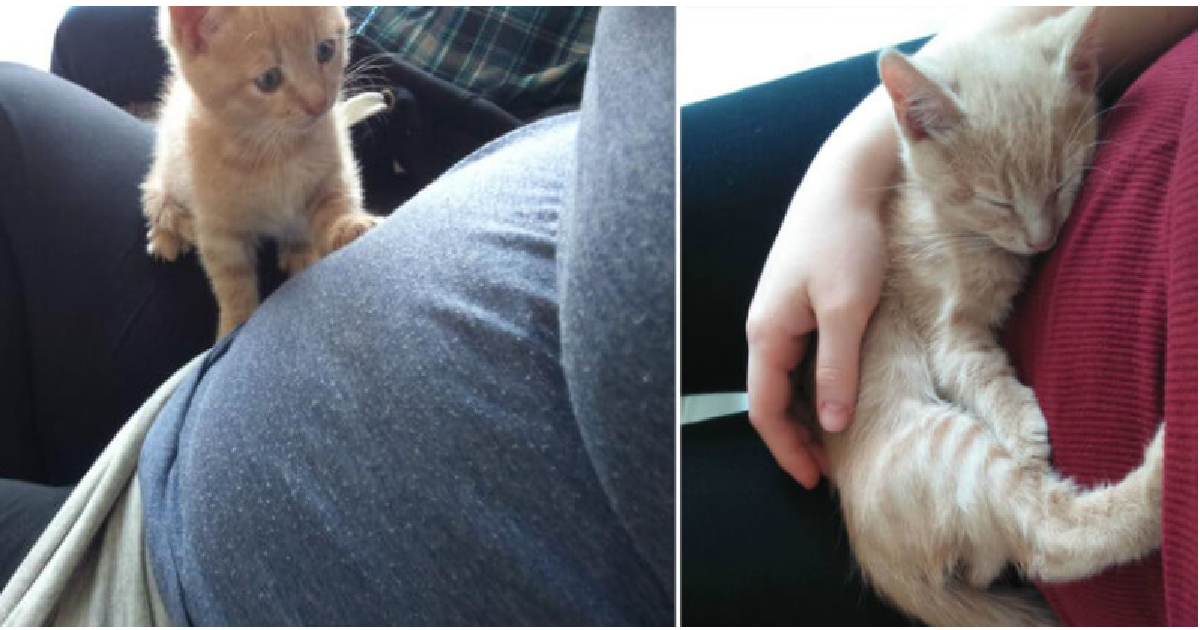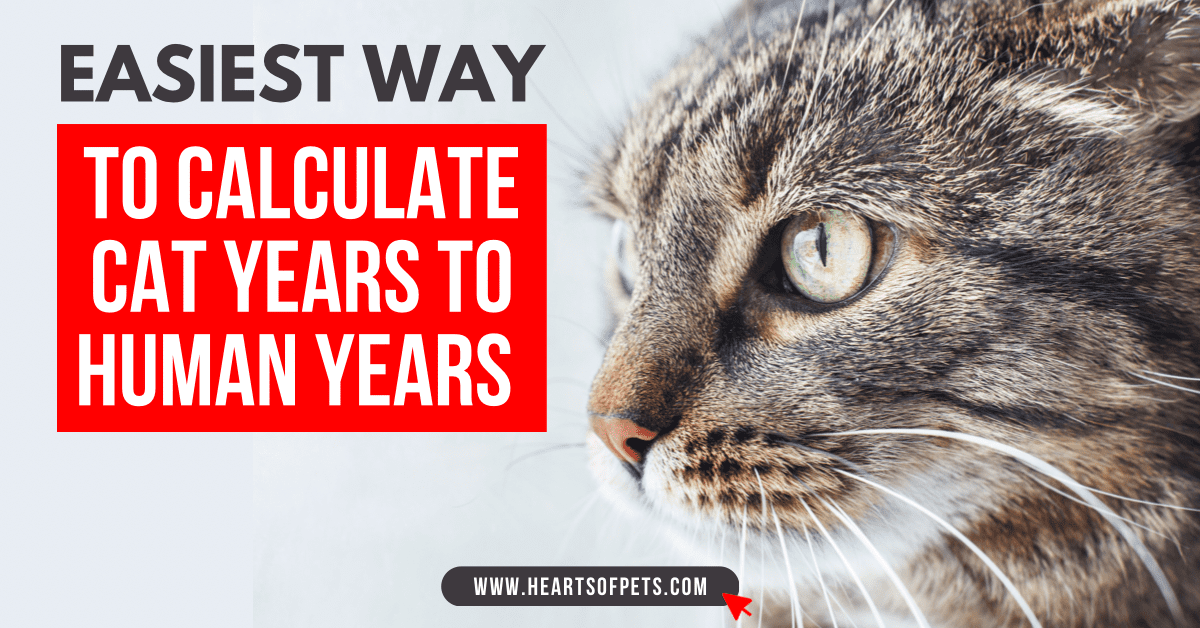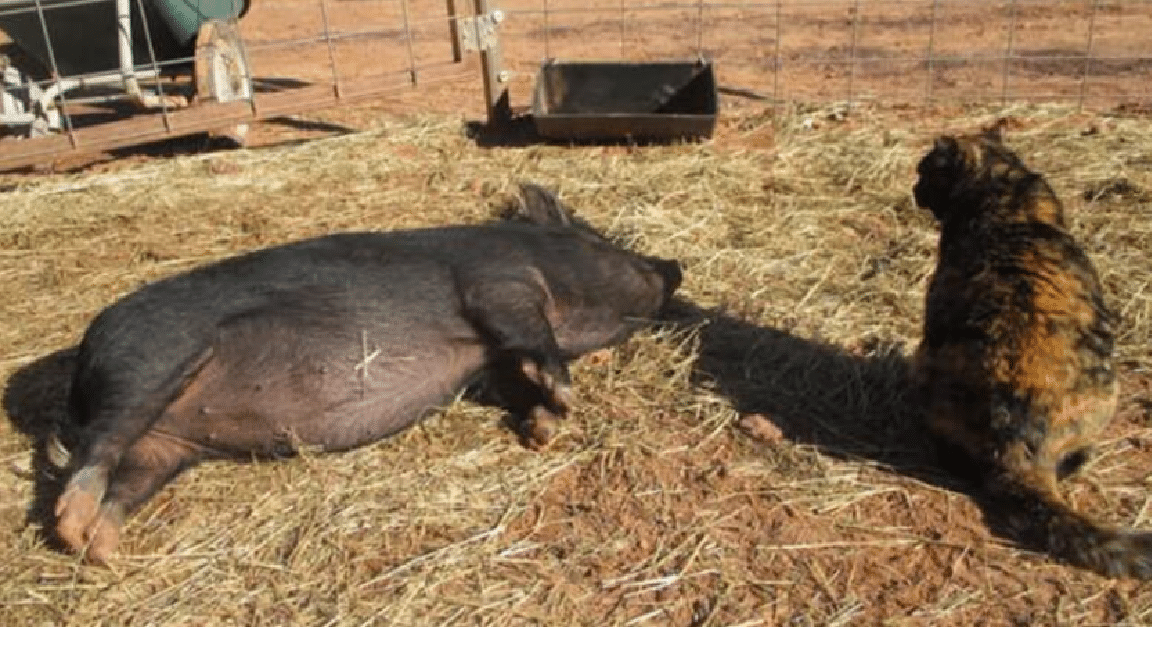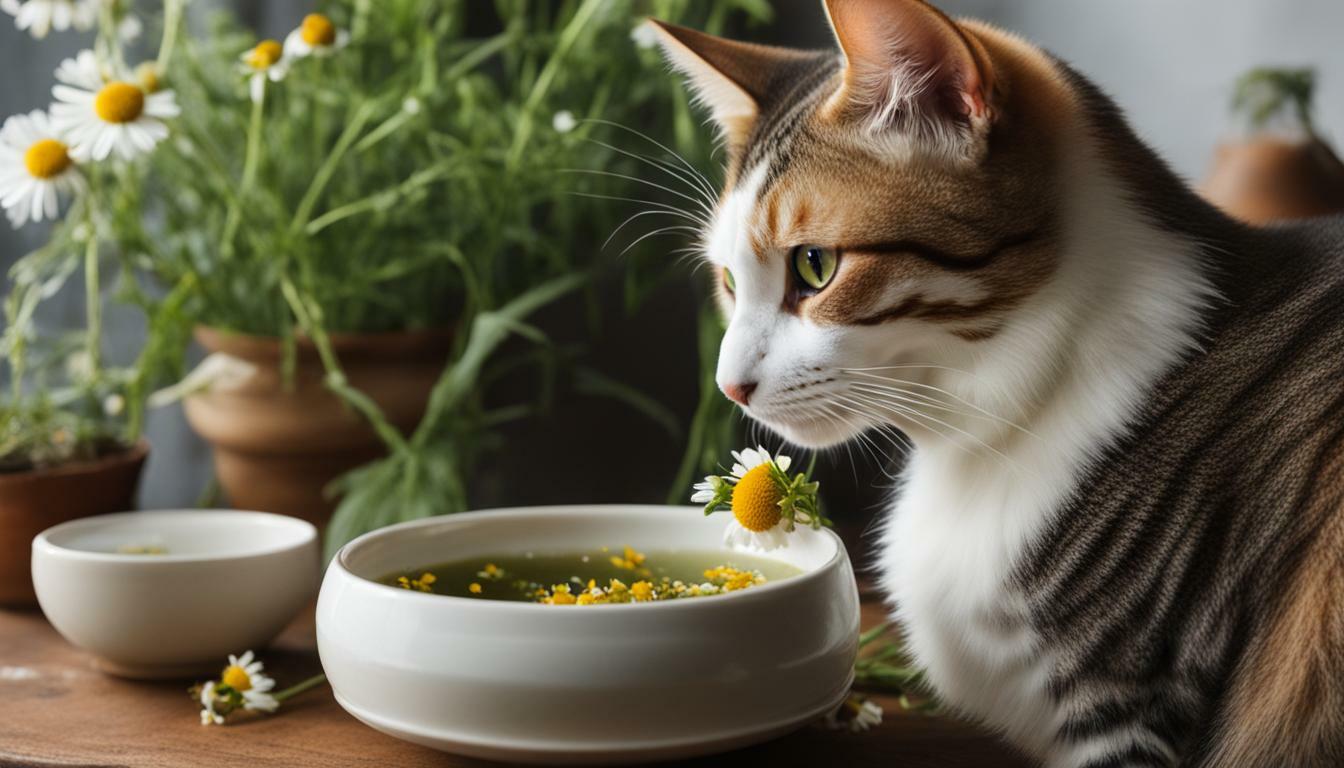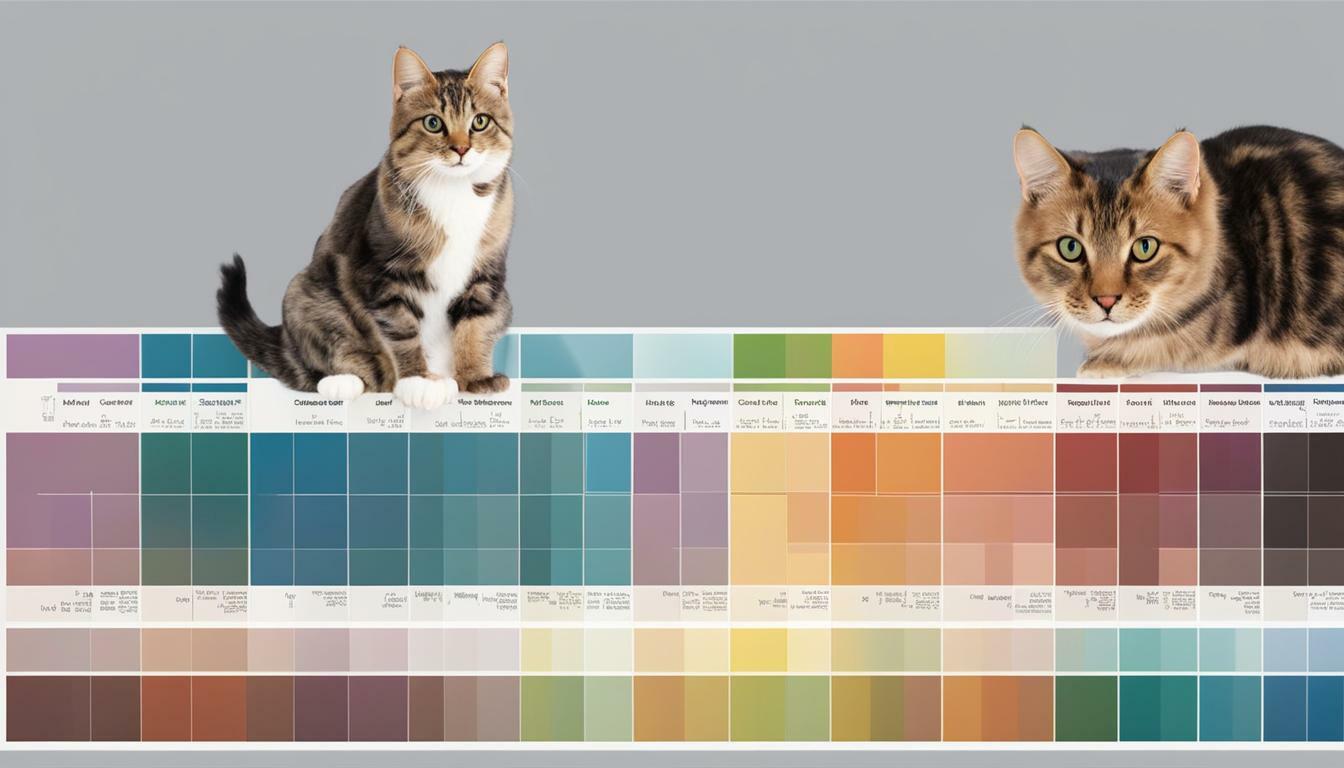
As a responsible cat owner, it’s essential to understand how heavy your cat should be to ensure their overall health and well-being. Maintaining an optimal weight is crucial, as carrying excess weight can lead to various health issues and a decreased life expectancy. So, how heavy should your cat be?
The average healthy weight for a cat typically falls between 8-12 pounds. However, it’s important to note that this can vary depending on factors such as body frame size, muscle mass, and breed. To determine the ideal weight for your cat, veterinarians use the Body Condition Score chart, which evaluates a cat’s weight on a 9-point scale, with 4-5 being the ideal range.
Key Takeaways
- The average healthy weight for a cat is usually 8-12 pounds, but this can vary.
- Veterinarians use the Body Condition Score chart to evaluate a cat’s weight on a 9-point scale.
- Cats of different breeds can have different healthy weight ranges.
- Age and life stage can affect a cat’s weight, with kittens growing rapidly and adult and senior cats being more prone to weight gain.
- Regular monitoring of your cat’s weight with the help of a veterinarian is essential.
Understanding the optimal weight for your cat and implementing healthy practices such as portion control, regular exercise, and mindful treat-giving can help keep your feline companion at a healthy weight and ensure a long and happy life together.
Factors Influencing Cat Weight
Several factors, such as breed, body frame size, and overall health, play a role in determining the ideal weight range for your cat. Understanding these factors can help you keep your furry friend at a healthy weight and reduce the risk of obesity-related health issues.
Cats come in all shapes and sizes, and their weight can vary significantly depending on their breed. Smaller cat breeds, like the Siamese or the Abyssinian, typically weigh between 6-10 pounds, while larger breeds, such as the Maine Coon or the Ragdoll, can weigh up to 20 pounds or more. It’s important to be aware of your cat’s breed and its corresponding healthy weight range, as exceeding this range can put your cat at risk of being overweight or underweight.
Another critical factor to consider is your cat’s body frame size. Just like humans, cats can have different body types, ranging from small and delicate to large and muscular. Different body frame sizes can affect a cat’s weight range. For example, a petite cat with a small frame may have an ideal weight range of 6-8 pounds, while a cat with a larger frame may have a healthy weight range of 10-12 pounds.
Lastly, your cat’s overall health plays a crucial role in maintaining an optimal weight. Certain medical conditions, such as thyroid issues or diabetes, can cause weight gain or loss. It’s important to consult with your veterinarian if you notice any sudden changes in your cat’s weight, as it could be indicative of an underlying health problem that needs to be addressed.
| Factors | Weight Range |
|---|---|
| Breed | 6-20+ pounds |
| Body Frame Size | 6-12 pounds |
| Overall Health | Varies depending on medical conditions |
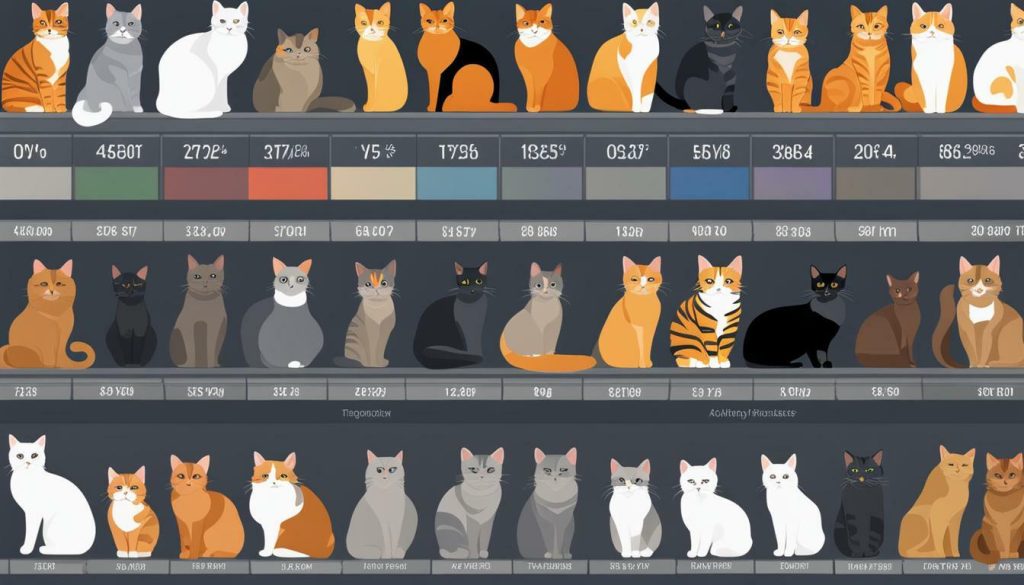
It’s essential to remember that every cat is unique, and their ideal weight may differ from the average. Consulting with your veterinarian and regularly monitoring your cat’s weight can help you determine the appropriate weight range and make necessary adjustments to their diet and exercise routine. By ensuring your cat maintains a healthy weight, you’re not only promoting their overall well-being but also increasing their life expectancy and quality of life.
The Average Healthy Weight for Cats
The average healthy weight for a cat typically falls between 8-12 pounds, but it’s important to remember that individual cats may vary. Maintaining a healthy weight is crucial for their overall well-being and can help prevent a range of health issues. According to the American Veterinary Medical Association, around 59.5% of cats in the United States are clinically overweight or obese, which can shorten their lifespan and increase the risk of conditions like diabetes, arthritis, and heart disease.
Veterinarians use the Body Condition Score chart to assess a cat’s weight and overall body condition. This chart divides a cat’s weight into different categories, from emaciated to obese, based on visual and palpable indicators. The ideal weight range for most cats falls within the 4-5 range on the 9-point scale. Regular monitoring of a cat’s weight and body condition is crucial for early detection of any weight-related issues.
The Body Condition Score chart can help guide cat owners in determining whether their cat is underweight, overweight, or within the healthy range. It takes into consideration factors such as the cat’s body frame size, muscle mass, and breed-specific weight ranges. Different cat breeds can have different healthy weight ranges, with smaller and petite cats weighing as little as 6-8 pounds and larger breeds exceeding 20 pounds. Consulting with a veterinarian can provide specific recommendations tailored to your cat’s breed and body type.
Age and life stage also play a role in a cat’s weight. Kittens, for example, require a higher caloric intake to support their rapid growth, while adult and senior cats may be more prone to weight gain due to changing metabolism and a decrease in physical activity. Adjusting their diet and promoting regular exercise can help prevent excessive weight gain and maintain a healthy weight throughout their lives.
| Breed | Healthy Weight Range (in pounds) |
|---|---|
| Maine Coon | 12-18 |
| Siamese | 8-12 |
| Persian | 8-15 |
“Keeping your cat at a healthy weight is crucial for their overall health and longevity. By monitoring their weight, providing balanced nutrition, and promoting regular exercise, you can help ensure they live a happy and healthy life.”
In conclusion, maintaining an average healthy weight for your cat is essential for their well-being. It’s important to consult with a veterinarian to determine the specific healthy weight range for your cat’s breed and body type. Regular monitoring, portion control, and promoting an active lifestyle can help prevent weight-related issues and contribute to a longer and happier life for your feline companion.
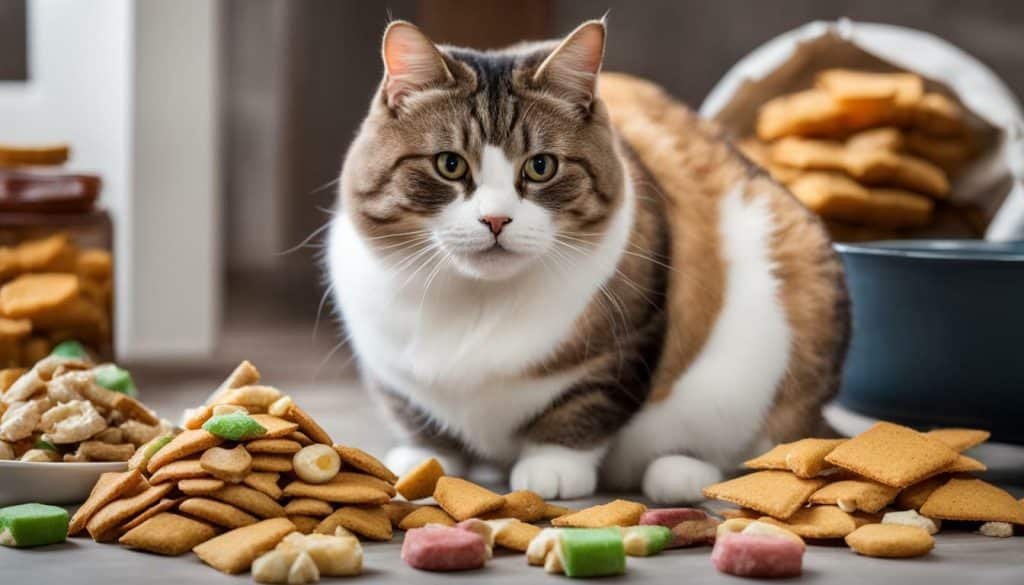
The Body Condition Score chart is a valuable tool that helps veterinarians evaluate a cat’s weight on a 9-point scale. It provides a standardized method for determining whether a cat is underweight, overweight, or at an ideal weight. By visually assessing certain physical characteristics, such as the presence of ribs and waistline definition, veterinarians can quickly determine a cat’s body condition and make recommendations for weight management.
The chart categorizes cats into different body condition scores, ranging from 1 (emaciated) to 9 (morbidly obese). A score of 4-5 is considered the ideal range, indicating that the cat is at a healthy weight with an appropriate amount of body fat and muscle mass. Cats with a score of 1-3 are considered underweight and may require dietary adjustments to gain weight, while cats with a score of 6-9 are considered overweight or obese and may need a weight loss plan to reduce the risk of health problems.
| Body Condition Score | Description |
|---|---|
| 1 | Emaciated: Ribs, backbone, and pelvic bones are visible with no palpable fat |
| 2 | Underweight: Ribs are easily palpable with minimal fat covering |
| 3 | Thin: Ribs are palpable with slight fat covering |
| 4 | Ideal: Ribs are palpable with a thin layer of fat covering |
| 5 | Ideal: Ribs are palpable with an appropriate amount of fat covering |
| 6 | Overweight: Ribs are difficult to palpate with an excess amount of fat covering |
| 7 | Obese: Ribs cannot be palpated under a thick layer of fat |
| 8 | Obese: Ribs cannot be palpated due to an excessive accumulation of fat |
| 9 | Morbidly Obese: Ribs and other skeletal structures are completely obscured by excessive fat |
The Body Condition Score chart is an essential tool for maintaining a cat’s weight within the ideal range. Regular assessments using this chart can help prevent health issues related to weight, such as diabetes, arthritis, and heart disease. It is important to consult with a veterinarian to determine your cat’s current body condition score and develop an appropriate weight management plan tailored to their specific needs.
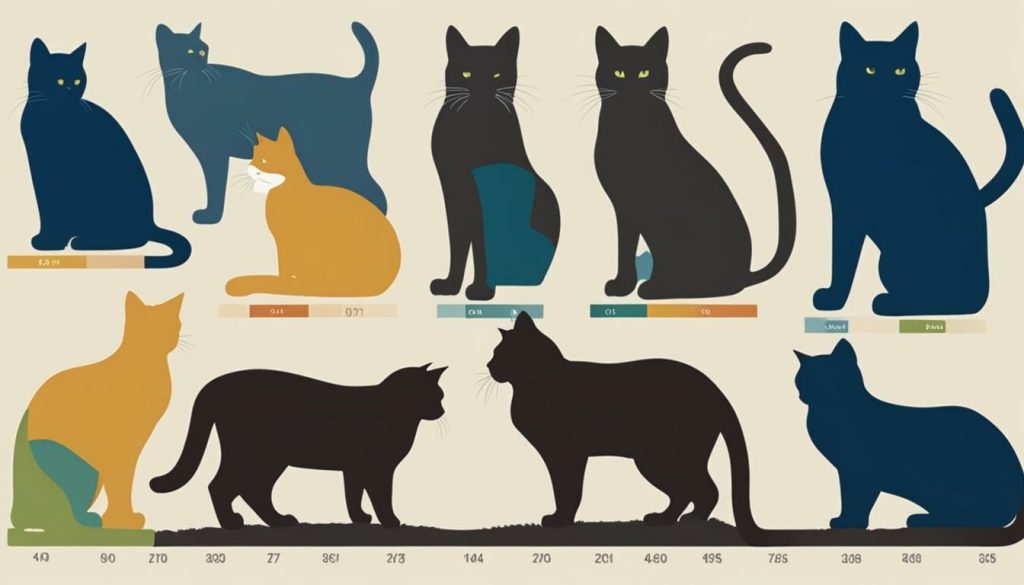
By utilizing the Body Condition Score chart and following your veterinarian’s guidance, you can ensure that your cat maintains a healthy weight and enjoys a longer, happier life.
Breed-Specific Weight Ranges
Different cat breeds have unique healthy weight ranges, so it’s essential to consider your cat’s specific breed when determining their optimal weight. While the average healthy weight for a cat is generally 8-12 pounds, some breeds may naturally weigh more or less.
For example, petite cats like the Siamese or Abyssinian typically weigh around 6-8 pounds, while larger breeds like the Maine Coon or Ragdoll can exceed 20 pounds. It’s important to note that these weight ranges are general guidelines, and individual cats within a breed may have variations based on their body frame size, muscle mass, and overall health.
“Each breed has its unique characteristics, and weight is no exception,” says Dr. Emily Thompson, a veterinarian specializing in feline health. “Knowing the average weight range for your cat’s breed can help you assess whether they fall within a healthy weight or if adjustments need to be made to their diet and exercise routine.”
To determine if your cat’s weight is within the appropriate range for their breed, you can consult with your veterinarian. They can assess your cat’s body condition using the Body Condition Score chart, which evaluates their weight in relation to their overall body composition. You can also discuss any breed-specific considerations or health concerns with your vet to ensure your cat maintains a healthy weight for their individual needs.
| Breed | Healthy Weight Range |
|---|---|
| Siamese | 6-8 pounds |
| Maine Coon | 15-25 pounds |
| Abyssinian | 6-8 pounds |
| Ragdoll | 12-20 pounds |
Remember, maintaining a healthy weight for your cat is crucial for their overall well-being. By understanding the breed-specific weight ranges and working closely with your veterinarian, you can help your feline friend maintain an optimal weight and enjoy a long, healthy life.
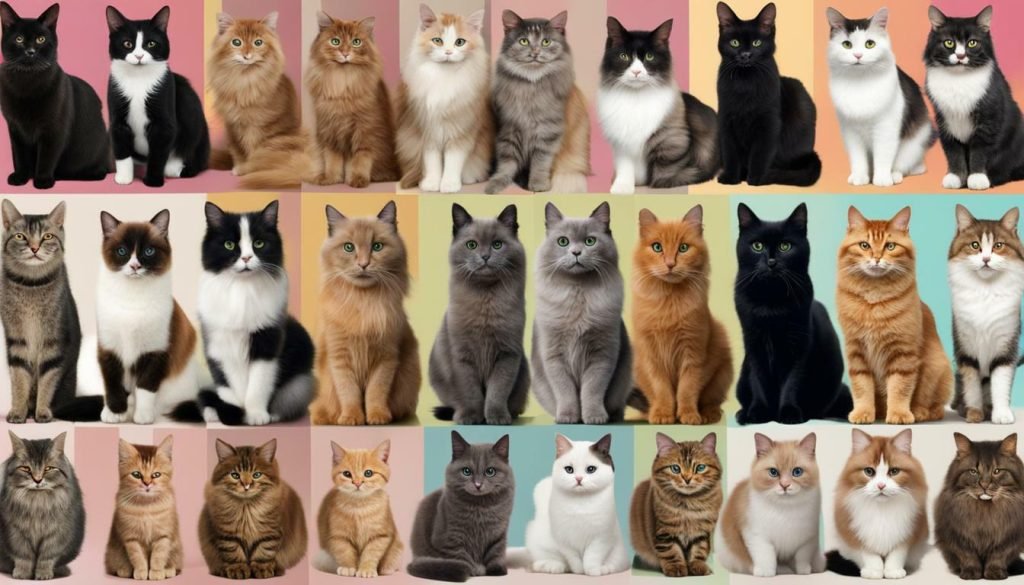
Age and life stage can significantly influence a cat’s weight, with kittens experiencing rapid growth and adult and senior cats being more prone to weight gain. Kittens require a high-calorie diet to support their growth and development. According to the American Association of Feline Practitioners, their nutritional needs are different from adult cats as they go through various growth stages. It’s essential to feed them a balanced diet formulated specifically for kittens to ensure they receive all the necessary nutrients.
As cats reach adulthood, their metabolism begins to slow down, and they may become less active. This can lead to weight gain if their calorie intake is not adjusted accordingly. The American Society for the Prevention of Cruelty to Animals recommends monitoring their weight regularly and adjusting their diet and portion sizes as needed to prevent obesity.
Senior cats are also more prone to weight gain due to decreased activity levels and changes in their metabolism. As they age, their muscle mass may decrease, and their body fat percentage can increase. This can lead to a decrease in their overall calorie needs. Older cats may benefit from a senior-specific diet that is lower in calories but still provides all the necessary nutrients. Regular exercise, such as interactive play sessions with toys, can help maintain muscle tone and prevent weight gain in senior cats.
It’s important to remember that every cat is unique, and their weight can be influenced by factors such as genetics, overall health, and individual metabolism. Consulting with a veterinarian is essential to determine the best approach to managing your cat’s weight based on their specific needs and circumstances.
| Age Group | Weight Guidelines |
|---|---|
| Kittens | Rapidly growing, requiring a high-calorie diet |
| Adult Cats | Monitor weight regularly, adjust diet and portion sizes as needed |
| Senior Cats | Decreased activity levels, monitor weight, consider senior-specific diet |
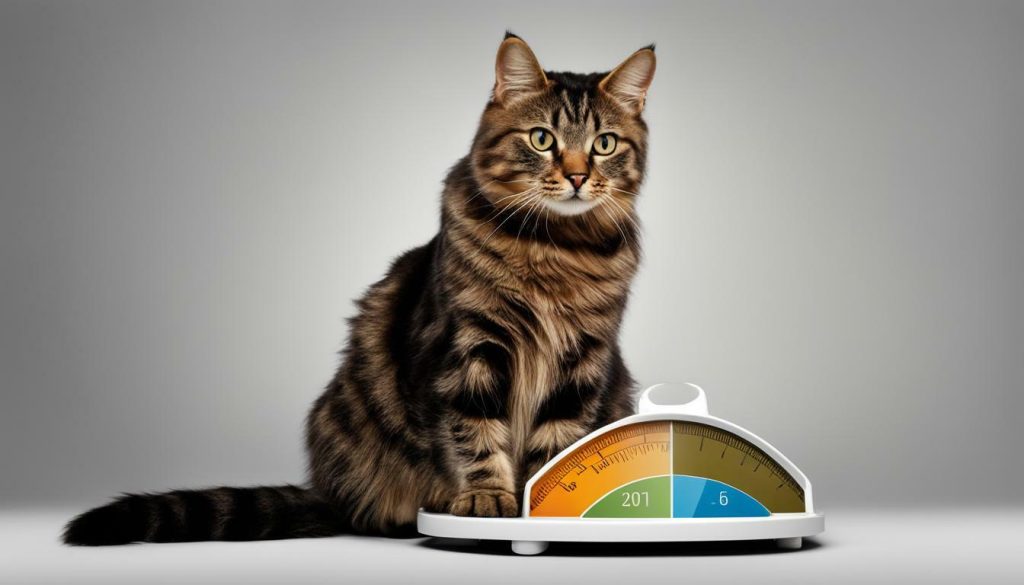
Regular monitoring of your cat’s weight and implementing healthy habits are crucial for maintaining their optimal weight. Monitoring their weight can help you detect any changes early on and take appropriate action to ensure they stay within the healthy range. It’s important to remember that cats, just like humans, can be prone to weight gain if they consume more calories than they burn through physical activity.
To keep your cat at a healthy weight, portion control is key. Feeding them the appropriate amount of food for their size, age, and activity level can help prevent overeating. The American Veterinary Medical Association recommends feeding cats based on their ideal weight, not their current weight. Consult with your veterinarian to determine the appropriate calorie intake for your cat and divide it into multiple small meals throughout the day.
Regular exercise is another important aspect of maintaining your cat’s weight. Engaging in playtime activities that encourage them to move and burn calories can help prevent weight gain and keep them physically active. Use interactive toys, such as laser pointers or feather wands, to stimulate their hunting instincts. Additionally, providing them with scratching posts and climbing trees can help keep them active and prevent boredom.
Quotes from experts:
“Exercise is not only beneficial for maintaining a healthy weight, but it also helps improve muscle tone, agility, and mental stimulation for your cat.”
– Dr. Sarah Thompson, Feline Veterinarian
Mindful treat-giving is another important aspect to consider. While treats can be a great way to reward your cat or provide additional nutrients, it’s important not to overdo it. Some treats can be high in calories, so be sure to read the labels and choose healthy options. Remember to factor in the calories from treats into your cat’s daily calorie intake to avoid unintentional weight gain.
By monitoring your cat’s weight, practicing portion control, encouraging regular exercise, and being mindful of treat-giving habits, you can help ensure that they maintain a healthy weight. Remember to consult with your veterinarian for personalized guidance and to address any concerns regarding your cat’s weight.
| Monitoring and Maintaining Cat Weight Tips |
|---|
| Regularly weigh your cat to track their weight and detect any changes. |
| Consult with your veterinarian to determine the appropriate portion size for your cat. |
| Engage your cat in daily playtime activities to encourage exercise and movement. |
| Choose low-calorie, nutritious treats and limit their intake. |
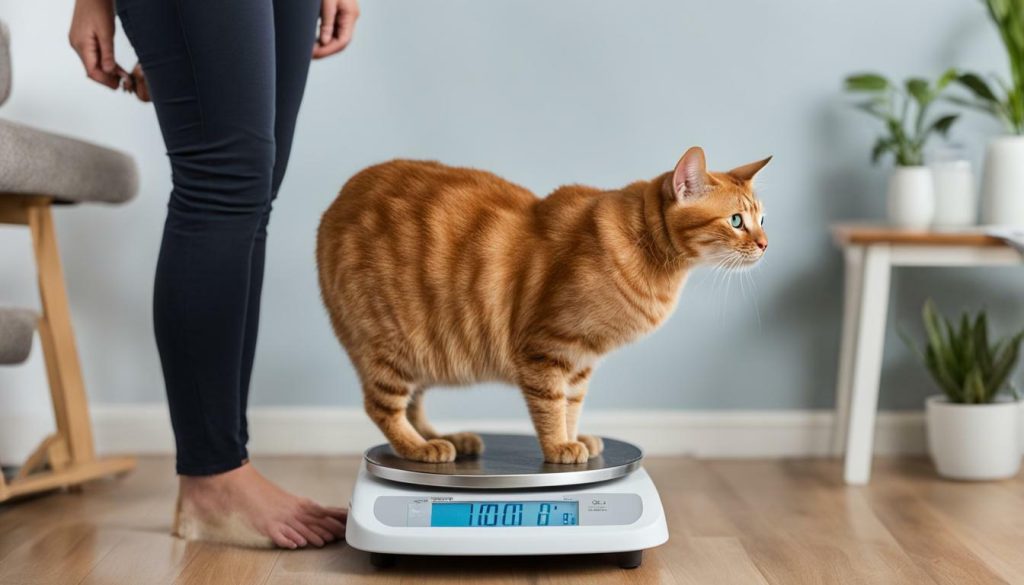
Seeking professional advice from a veterinarian is essential when it comes to ensuring your cat’s weight is within the healthy range. Veterinarians play a crucial role in helping you understand your cat’s unique needs and providing guidance on maintaining their optimal weight. They have the knowledge and expertise to assess your cat’s body condition and recommend appropriate dietary and exercise plans.
One of the key tools veterinarians use to evaluate a cat’s weight is the Body Condition Score chart. This chart allows them to assess your cat’s overall body composition, including muscle mass, fat distribution, and overall condition. By using a 9-point scale, veterinarians can determine whether your cat falls within the ideal weight range or if adjustments need to be made.
| Body Condition Score | Weight Range |
|---|---|
| 1-3 | Underweight |
| 4-5 | Ideal weight |
| 6-9 | Overweight |
Additionally, veterinarians can provide breed-specific weight ranges, taking into account the variations in size among different cat breeds. This ensures that your cat’s weight is appropriate for their specific breed characteristics. They can also take into consideration your cat’s age and life stage, as weight management needs may differ between kittens, adult cats, and senior cats.
Regular check-ups with your veterinarian allow them to monitor your cat’s weight and make any necessary adjustments to their diet and exercise routine. They can provide personalized recommendations based on your cat’s individual needs, ensuring that their weight is maintained within a healthy range. Remember, a healthy weight is not only important for your cat’s physical well-being but also for their overall quality of life.
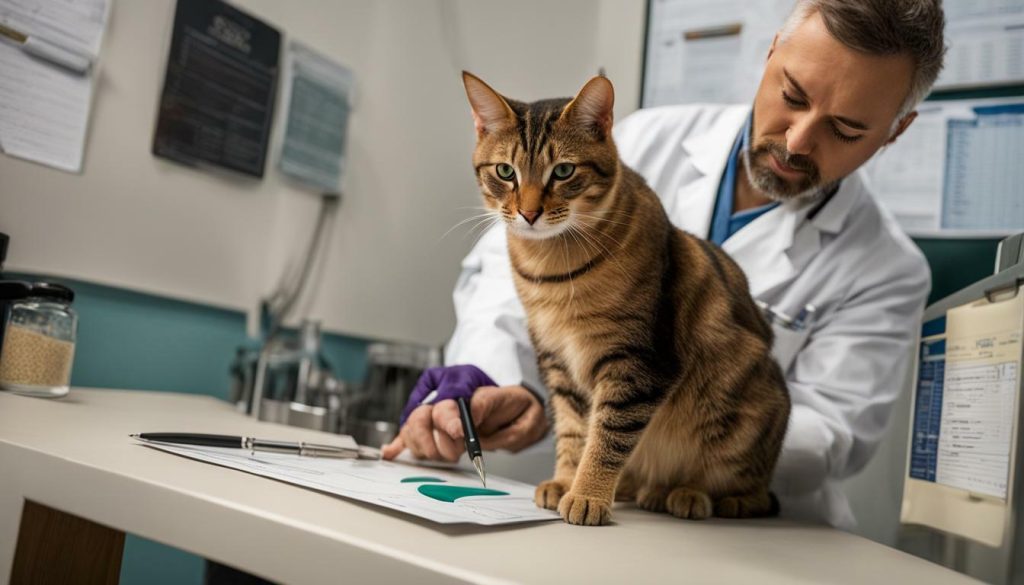
Understanding how heavy your cat should be and taking the necessary steps to maintain their weight can significantly contribute to their overall wellbeing. According to the American Veterinary Medical Association, a staggering 59.5% of cats are clinically overweight or obese, leading to various health issues and a decreased life expectancy.
The average healthy weight for a cat typically falls between 8-12 pounds, although this can vary depending on factors such as body frame size, muscle mass, and breed. To evaluate a cat’s weight, veterinarians use the Body Condition Score chart, which assesses a cat’s weight on a 9-point scale where 4-5 falls within the ideal range. It’s important to note that different cat breeds can have different healthy weight ranges, with petite cats weighing as little as 6-8 pounds, while larger breeds can weigh over 20 pounds.
Age and life stage are also crucial in determining a cat’s weight. Kittens experience rapid growth, while adult and senior cats are more prone to weight gain due to changing metabolism and a more sedentary lifestyle. Therefore, regular monitoring of your cat’s weight with the assistance of a veterinarian is essential.
By practicing portion control, promoting regular exercise, and being mindful of treat-giving habits, you can help your cat maintain a healthy weight. Remember, consulting with a veterinarian can provide you with expert guidance and tailored recommendations based on your cat’s specific needs. By prioritizing your cat’s weight management, you are ensuring their overall health and longevity.
FAQ
Why is determining the optimal weight for my cat important?
Determining the optimal weight for your cat is crucial for their overall health and well-being. Carrying excess weight can lead to various health issues and a decreased life expectancy.
What is the average healthy weight for a cat?
The average healthy weight for a cat is typically 8-12 pounds, but this can vary depending on factors such as body frame size, muscle mass, and breed.
How can I evaluate my cat’s weight?
Veterinarians use the Body Condition Score chart to evaluate a cat’s weight on a 9-point scale, with 4-5 being the ideal range.
Do different cat breeds have different healthy weight ranges?
Yes, cats of different breeds can have different healthy weight ranges, with petite cats weighing as little as 6-8 pounds and larger breeds weighing over 20 pounds.
Does age affect a cat’s weight?
Yes, age and life stage can affect a cat’s weight. Kittens grow rapidly, while adult and senior cats may be more prone to weight gain due to changing metabolism and a more sedentary lifestyle.
How can I maintain my cat’s weight?
Regular monitoring of your cat’s weight with the help of a veterinarian and practicing portion control, regular exercise, and mindful treat-giving can help keep your cat at a healthy weight.
Why should I consult a veterinarian regarding my cat’s weight?
Consulting with a veterinarian is important because they can provide expert guidance, tailor recommendations to your cat’s specific needs, and address any health concerns related to weight.

